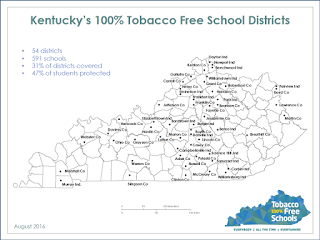Republican senators scale back statewide smoking-ban efforts to schools, where local officials ‘don’t want to be tobacco police’

“It’s the first time to be presented to the legislature, but we are optimistic that it will become law,” Sen. Ralph Alvarado, a Winchester physician, told the Lexington Herald-Leader. His co-sponsor is Sen. Julie Raque Adams of Louisville, chair of the Senate Health and Welfare Committee.
Alvarado told reporter Jack Brammer that he still prefers a statewide ban on smoking in workplaces, but doubts it can pass. Gov. Matt Bevin has said smoking bans should be a local issue, but hasn’t addressed the idea of a statewide school ban. His office “and the Kentucky Education Association did not respond to requests for comments on Alvarado’s bill,” Brammer reports. Many teachers smoke.
Senate Bill 78 “would prohibit use of tobacco products by students, school employees and visitors in schools and school vehicles and at school-sponsored activities, beginning no later than the 2018-19 school year,” Brammer writes. “It also would require that signs be posted at schools, declaring them smoke-free areas.”
Kentucky has the third highest youth smoking rate in the nation, with 17 percent of its high school students smoking. An estimated 3,200 of Kentucky’s youth under the age of 18 will become daily smokers, according to Erica Palmer Smith, government relations director for the American Cancer Society in Lexington.
“This is an important step in reducing our highest-in-the-nation youth smoking rate of 16.9 percent,” Palmer Smith told Brammer. “Everyone has the right to a healthy smoke-free area. That certainly should be the case in our schools.”
 |
| Status as of August 2016; additional districts may have acted since |
About 70 of Kentucky’s 173 school districts already ban tobacco products on school property, and all limit smoking, but the policy varies from district to district, according to Brad Hughes, a spokesman for the Kentucky School Boards Association. “For example, he said, a district might not allow use of tobacco products on school property but might not enforce the policy at an outside football game,” Brammer reports. “Alvarado said his bill would ban tobacco use at all school events, but he will leave it up to school boards to set the penalties. . . . His initial bill outlined punishments for violating the measure, ranging from suspensions and expulsions to a public offense action.”
The School Boards Association hasn’t taken a position on the bill, but Hughes told Brammer, “Some superintendents have said they do not want to be tobacco police.”
Alvarado said, “Some school officials got heartburn over my original bill. They want local control by school boards as much as possible. I’ll negotiate with them on that, but we will police every school district. The goal is to see the reduction of the youth smoking rate in Kentucky. Most people who smoke start in their teen years because of peer pressure. They dramatically shorten their lifespan.”
Tom Shelton, executive director of the Kentucky Association of School Superintendents, said his group is “working with the sponsor currently and continuing to review the bill with the proposed changes to determine our level of support.”
Brammer reports, “The proposal has the strong support of the Kentucky Chamber of Commerce,” quoting Ashli Watts, the lobby’s vice president of public affairs: “We very much wanted a smoke-free Kentucky law, but if we can’t get that, making tobacco products off-limits on school property is a good step.”
And what about the tobacco industry? “Altria Group Inc., one of the world’s largest producers and marketers of tobacco and the parent company of Philip Morris USA, is ‘monitoring’ Alvarado’s bill and does not advocate youth smoking, spokesman David Sutton said,” Brammer reports, quoting him: “Our view is that kids should not smoke or use tobacco products. As manufacturers of products intended for adults, Altria’s tobacco companies have an important role to play in preventing underage tobacco use. We agree that there are places where smoking should not be permitted, such as schools and day-care facilities. We also support restrictions on the use of e-cigarettes in schools and other places meant for children.”